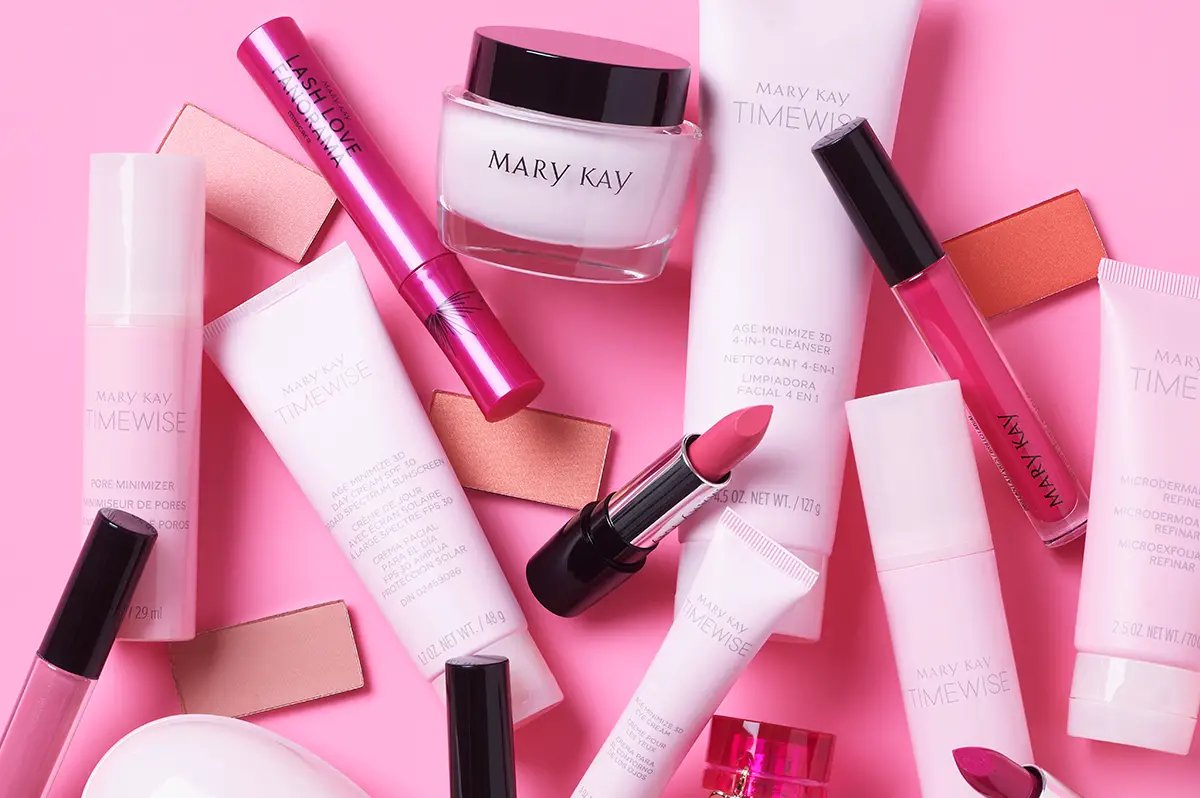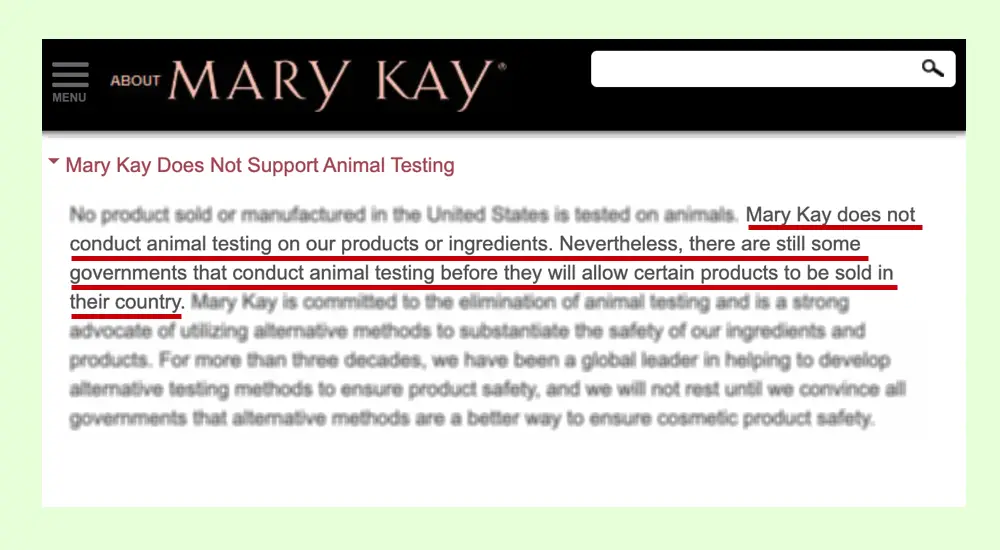Mary Kay has a strong message about empowering women. But we can’t help but raise an eyebrow at its multi-level marketing (MLM) business structure and shady cruelty-free policies.
Mary Kay is not cruelty-free as it distributes its cosmetics where animal testing is required by law. While Mary Kay has products free of animal-derived ingredients, it is not considered a vegan brand.
According to Forbes, Mary Kay brought in a revenue of $2.8 billion in 2021. But a couple of us, including the Federal Trade Commission, find its MLM model quite dodgy.
The brand claims its business model is to empower women – but does that really ever happen?
We’re here to help you understand who you are supporting by looking into Mary Kay’s business structure, animal testing policies, and vegan status.
You’ll also decide whether you can confidently spend your money knowing animal welfare and the environment are considered too.
Ultimately, you'll know whether to click "add to cart" for your next purchase or if you need to fill out a feedback form with the words, " we think you can do better."
Is Mary Kay Cruelty-Free and Vegan?
Mary Kay is Not Cruelty-Free
Test any of its products or ingredients on animals
NO
Purchase any ingredients tested on animals within its supply chain
No
Distribute its products to any countries that require animal testing by law.
yes
While Mary Kay claims to be ahead of the curve with their animal testing bans – they still distribute to China, where animal testing is required by law.
This brings us to the next point:
Mary Kay is Not Vegan
Even if Mary Kay may have some plant-based products, we can’t consider any of them “vegan” because it’s not cruelty-free.
The website does not display the following:
We can share that some of the most common ones you might expect to find including honey, beeswax, lanolin, collagen, carmine, and squalane.
If you're interested in Mary Kay brand alternatives – keep reading or click on this link: Mary Kay vegan brand alternatives.
Animal Testing Policy and History
Although Mary Kay announced that it would personally stop all animal testing in 1989. More recently, however, it still chose to enter the Chinese market (where animal testing is required on all international cosmetics entering the country).
Cruelty-Free Status in 2022
Here is a screenshot of Mary Kay’s official statement regarding its cruelty-free policies and vegan products, taken from its website:
Certification
Mary Kay has no cruelty-free certification.
As much as it would be nice to see cruelty-free certification – it cannot happen as long as the brand continues with its current animal-testing policies.
Besides PETA, a far more reputable organization you can trust is the Leaping Bunny association, which has rigid (but excellent) standards.
Leaping Bunny is the only internationally recognized certification.
Is Mary Kay Sold Where Animal Testing is Required By Law?
Yes, Mary Kay distributes its products in China, where animal testing on cosmetics is required as products arrive at the border.
China has a shocking track record. It is the country with the most animal testing globally, with over 20 million animals used per year.
However, if you live in China or are concerned about its cruel beauty policies, there are a couple of loopholes.
Here's how to find cruelty-free cosmetics in China: Are Cosmetics Made in China Cruelty-Free?
What Mary Kay Products Are Vegan?
We don't consider Mary Kay's vegan ranges holistically vegan because the brand is not 100% cruelty-free.
Since Mary Kay doesn’t disclose its ingredient lists on its website or packaging, nor does it have a vegan product filter – it’s also challenging to know what is “safer” for vegetarians and vegans to use.
However, you can email customer service and inquire about a specific product if you’re curious.
Vegan Alternatives to Mary Kay
Fear not – there are many alternatives to Mary kay you can use that are certified cruelty-free and vegan to choose from
Here are some beauty brands we recommend trying:
Brand | price range | 100% vegan | Certification |
|---|---|---|---|
$15 - $30 | Yes | PETA | |
$18 - $50 | Yes | Leaping Bunny | |
$15 - $200 | Yes | PETA, Choose Cruelty-Free | |
$30 - $50 | Yes | Leaping Bunny | |
$15 - $50 | No, vegan-friendly | Leaping Bunny | |
$15 - $30 | Yes | PETA |
Is Mary Kay Natural and Organic?
Mary Kay isn’t considered natural or organic.
However:
So what’s the difference between clean and natural?
Which is better?
Clean vs. Natural Ingredients
The term "natural" is not regulated for cosmetics and skincare. In other words, it doesn't hold one specific meaning.
Usually, it means a product is free of more toxic synthetic ingredients, including parabens, phthalates, sulfates, and more. But people also interpret "natural" to mean ingredients of immediate plant origin.
Here's the thing: "natural" is not necessarily good. Just because an ingredient is natural (take olive oil, for example) doesn't mean you should rub it on your skin and sit in the sun, so you fry like a chicken breast!
All products use a certain amount of synthetic ingredients in their formulas. Mary Kay is no exception – but it does choose to use better or clean synthetics.
If a synthetic ingredient is "clean," it means it is safe and non-toxic for us. Its purpose is to preserve the stability of a beauty formulation.
Does Mary Kay Use Safe Ingredients?
According to Skin Safe, Mary Kay has an 82- 100% allergen-free ranking across 36 products.
Mary Kay claims to have banned over 1300 ingredients they don’t consider safe but doesn’t list or mention any of them apart from one range.
We can tell you that its Naturally range is free from parabens, phthalates, synthetic fragrances, synthetic dyes, and SLS/ SLES.
The EU/UK Have Stricter Ingredient Regulations
You HAVE to read up on any product’s ingredient list before you make a purchase, especially if you live in the United States.
The reason why will shock you.
The FDA has only banned or restricted 11 harmful chemicals from cosmetics within the country. Europe and the UK, on the other hand, have banned 1,328!
Mary Kay doesn’t claim to be clean, but it does have a solid commitment to safety.
As a general rule, you want to avoid these cosmetic ingredients:
Are Cruelty-Free Ingredients Safe?
There is no reason why cruelty-free products shouldn’t be as safe as anything tested on animals.
Not only is it easy to test ingredients without using animals altogether, but there are so many pre-approved ingredients you can use to make cosmetics that there is no need.
If you’re interested, here’s more on the subject: Are Cruelty-Free Cosmetics Safe?
But let's move on to what we're really worried about – Mary Kay's ethics.
Is Mary Kay Sustainable and Ethical?
Mary Kay has a few sustainability and ethical initiatives that align with the company's values.
Some ethical causes Mary Kay supports are women-related cancers, domestic violence, and gender-based violence prevention and support.
This is done through the Mary Kay Foundation.
The brand has also helped children born with cleft palates in China.
It's no secret that the world has a huge waste problem, and cosmetic brands only make it worse by using unsustainable packaging and harmful ingredients.
Some of the ways Mary Kay is taking environmental accountability:
Multi-Level Marketing: Is It Just Another Money-Making Tactic?
What’s the difference between Multi-Level Marketing (MLM) and a pyramid scheme? And is Mary Kay honest with its independent beauty consultants or direct sellers?
Exposes and articles from as early as 2008 and as recently as 2021 have questioned Mary Kay’s selling tactics. Even John Oliver gave the company a grilling in 2016.
There are horror stories of recruits going into debt, having their reputations compromised, their marriages broken, and mutual trust shattered between ones.
And for what?
To chase Mary Kay’s goals and objectives?
Mary Kay claims its business model can help beauty consultants boost their incomes. Some top earners even win the company's signature pink Cadillacs.
However, these success stories are the exception and not the rule.
Here’s why Multi-Level Marketing schemes, like Mary Kay, often end badly:
And so, the cycle continues.
Has Mary Kay changed its business practices since then?
Unfortunately, a quick Google of “Mary Kay horror stories” shows that this leopard has not changed its spots.
Final Thoughts
Like most MLM brands – there is the good, bad and ugly.
The good thing is that Mary Kay makes clean, well-developed formulas that are safe for the skin.
It also has a couple of commendable initiatives, including its active recycling program and gender-based violence campaign it supports through its foundation.
On the bad side – Mary Kay has taken a step back with its cruelty-free status since it decided to distribute to China. It also does not share its ingredient lists or mention which products are plant-based.
And the ugly side to the brand is that it continues to operate using an MLM scheme which is proven to leave most consultants broke – not empowered.
It claims to support woman empowerment, but it seems to care more about its bottom line than anything else. Otherwise, it would choose a safer and more effective way to help women make money.
We hope to see a change in this issue, but it is unlikely. As consumers, it is up to us to stand for what we will and won't accept from our cosmetics. This is something we cannot accept.


